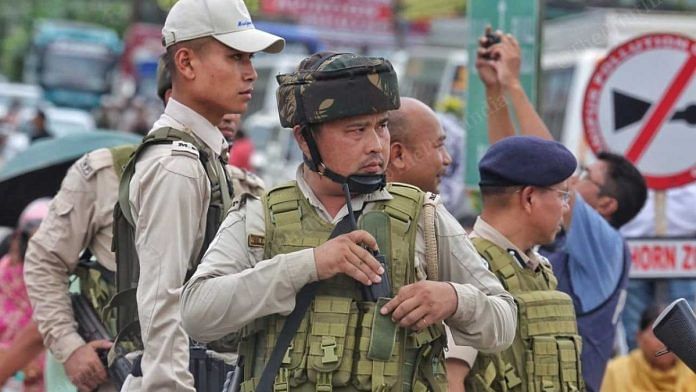There is no rationale for the Manipur government to appoint a highly decorated Army Special Forces veteran to the recently created position of Senior Superintendent of Police (Combat). Why Manipur Police would need an SSP (Combat) when the Army, Assam Rifles, Central Reserve Police Force, Border Security Force, and many other central troops are already deployed in the deeply divided state is a question that has an inbuilt answer. For there can be no other reason to bring in a decorated officer from an outstanding battalion in an appointment that never existed even in the heydays of insurgency. Manipur Police needs command, not combat leadership.
The efficacy of any police force is measured by the quality of its leadership and how command is wielded from top to bottom. In policing, it is a more complicated phenomenon since the requirements range from gruesome to comedic. Leadership, therefore, has to be of the kind that can take on all those responsibilities with a certain calmness and compassion – which is really at the opposite end of the spectrum from Special Forces combat leadership.
A grossly unfair move
Army Special Forces officers and troops are the antithesis of policing requirements, for their ethos is constructed upon covert, clinical combat skills that apply maximum force with the minimum of human resources. ‘Silent and shadowy’ is the standard operating procedure, whereas policing requires maximum presence with minimum fear, and for force to be effective among people at large. Policing generally, and in Manipur specifically, should be about applying social solace and soothing the people, a skill set that Special Forces are not expected to master even when holidaying. This appointment, therefore, is a grossly unfair move by the government of Manipur.
Colonel Nectar Sanjenbam (retired), KC, SC, should not be thrust into a role that has no justification in the current policing manuals. The Manipur government is also pushing into dangerous terrain with this appointment. Thrusting a native of the state into a sharp civil-war-like situation imposes further stresses on all the Special Forces units that draw troops and officers from Manipur and neighbouring states. Bonds developed over decades of training and operations are now going to be put under the lens of anthropological lines. The Army and India’s national security don’t need another challenge like this.
Also read: Manipur has declared no-confidence in MHA. FIR against Assam Rifles, disarmed IR Battalion
Comparing Kashmir & Manipur
The difference between the security situation in Kashmir and Manipur couldn’t be more stark.
The government is approaching the disintegration of state and society in Manipur, much as it would in Kashmir circa 1990s. But the bitter truth is that the security situation in 2023 Manipur is worse than it was in Kashmir for the simple reason that armed civilians were never brazen enough to mount attacks on neighbouring villages. And the fact that armed personnel carrying unauthorised weapons and ammunition are engaged in firefights in Manipur over longer durations than the usually trigger-happy troops separating Indian and Pakistani positions along the Line of Control (LoC). There is no more damning comment than the fact that firefights in Manipur have gone on for days.
In comparison, the ceasefire between two armies that have fought multiple wars has ‘largely’ lasted over three years on the LoC in Kashmir. Other than sporadic violations, the ceasefire has generally held good despite the toxicity prevailing regionally between India and Pakistan.
In Manipur, on the other hand, the unbridled toxicity between Meiteis and Kukis is precipitously worsening the situation to such an extent that firing between villages in Churachandpur and Bishnupur districts recently continued for more than three days. Firing between fixed positions for such a long period is a very unusual occurrence, especially when it involves only civilians. It would indeed be uncommon for a firefight between militants and troops to last that long in Jammu and Kashmir, the hotbed of jihadi terrorism. But this is happening in today’s Manipur, where the untrained but armed-to-the-teeth comrades-in-arms are shooting neighbours at will, and are even using drones.
Also read: Manipur sexual violence is political. Don’t deny accountability by calling it a ‘mindless mob’
‘Unprecedented’ situation
The decline in conditions is so severe and glaring that a senior Army officer with considerable insurgency experience was moved to declare the situation in Manipur as “unprecedented”. This level of transparency is unusual – and when expressed in the public domain by a serving officer, the severity of the situation becomes much more apparent.
The conditions are indeed unprecedented, and the levels of internecine violence unseen in any part of India that was in the grips of an insurgency. This is the major reason that seasoned commentators have used the term ‘civil war’ to describe Manipur.
It’s cruel, but comparisons are irresistible in such a situation. Nagaland and Mizoram never witnessed pitched firefights between villages in their free-running insurgency. Assam nor Punjab saw any such firing incidents when the United Liberation Front of Asom (ULFA) and the Khalistanis were running amok. The hapless Kashmiri Pandits didn’t trade lead with their neighbours and annihilators. And taking the analogy toward the terrorising Naxals, there has never been an inter-village conflict quiet like this, ever. The picture in 2023 is far worse than ever in terms of societal bonds and national security. The disintegration of state and society is complete and irrevocable.
It will likely remain irreversible when the Government of Manipur envisions its role as upholder of law more in combat rather than healing societal divisions through the quality of its policing leadership. Appointing a Special Forces veteran for combat roles is indirectly acknowledging clear leadership failings in the police.
Manvendra Singh is a Congress leader, Editor-in-Chief of Defence & Security Alert and Chairman, Soldier Welfare Advisory Committee, Rajasthan. He tweets @ManvendraJasol. Views are personal.
(Edited by Zoya Bhatti)



